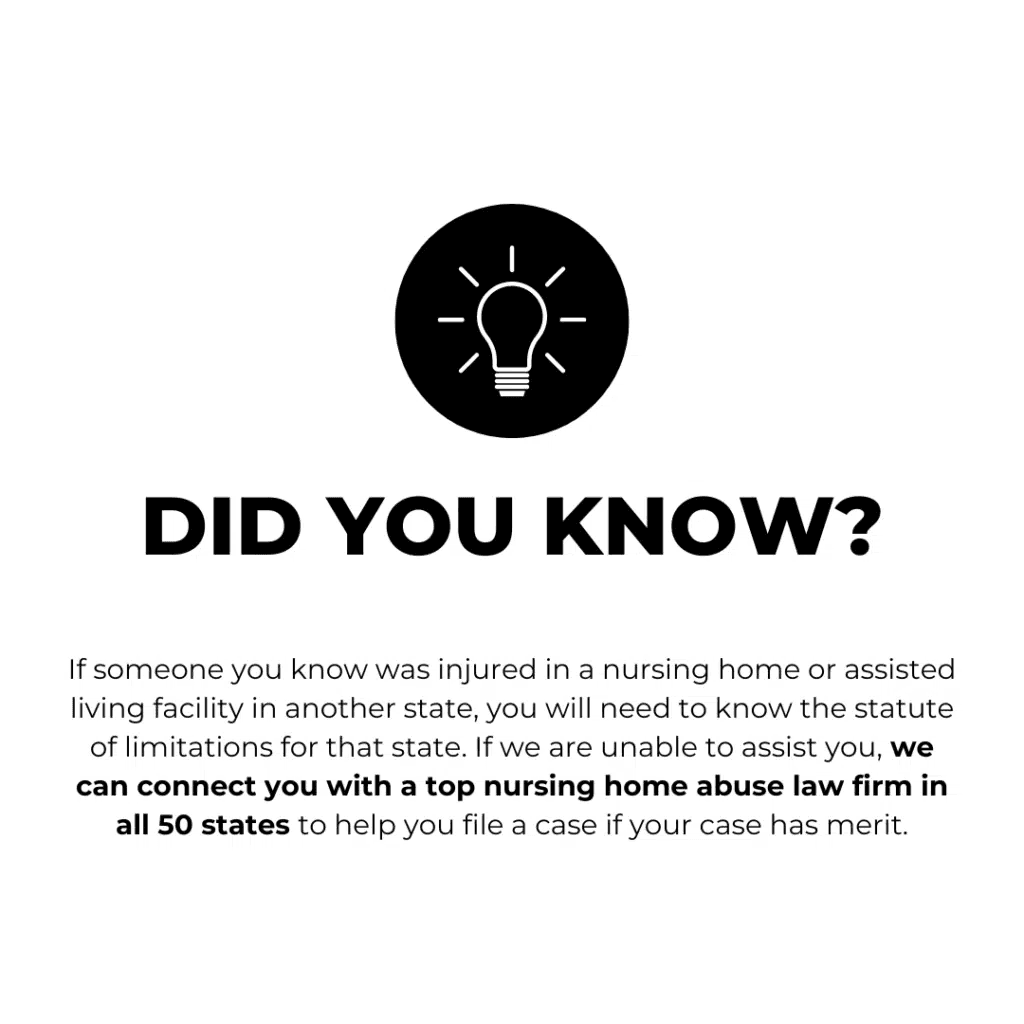
Nursing home abuse and neglect put vulnerable residents at serious risk, leading to malnutrition, dehydration, infections, and preventable injuries. When facilities fail to provide adequate care, residents suffer, and families are left feeling helpless. Lack of supervision, improper medical treatment, and unsafe conditions can result in devastating harm. Understanding the warning signs, knowing your legal rights, and holding negligent facilities accountable are crucial steps in protecting your loved ones. Learn how to take action and seek justice.
November 6, 2024
3 min
Making decisions about nursing home care for a loved one is a process fraught with emotional and legal challenges. As our loved ones age or as they face debilitating illnesses, their ability to make informed decisions about their care often diminishes. This can leave families in a difficult position, balancing respect for their loved one’s autonomy and ensuring their safety and well-being. Two critical legal tools that can help navigate these challenges are guardianship and power of attorney (POA). These legal mechanisms provide the authority to make decisions on behalf of an incapacitated individual, ensuring their needs are met when they can no longer decide for themselves.
This article will explore the differences between guardianship and power of attorney, their roles in nursing home cases, and the legal considerations families should consider when dealing with these critical issues.
Guardianship is a legal relationship established by a court in which an individual (the guardian) is appointed to make decisions for another person (the ward) who is unable to make decisions for themselves due to incapacity. The scope of a guardian’s authority can vary depending on the type of guardianship granted, but it generally includes making decisions about the ward’s personal, financial, and medical affairs.
Obtaining guardianship involves a formal legal process that starts with filing a petition in court. The petitioner (usually a family member) must present evidence that the individual cannot manage their affairs due to a mental or physical condition. This often involves medical assessments and sometimes psychological evaluations to establish the extent of the incapacity.
The court then reviews the evidence and may hold a hearing where interested parties can present their views. If the court is satisfied that guardianship is necessary, it will issue an order appointing the guardian. The guardian must often file regular reports with the court detailing the ward’s condition and how the guardian manages the ward’s affairs. This ongoing supervision ensures that the guardian is fulfilling their duties and acting in the ward’s best interests.
The guardian’s role is crucial in the context of nursing home care. The guardian may be responsible for selecting a nursing home that meets the ward’s needs, consenting to medical treatments, and managing the ward’s financial resources to pay for care. The guardian must act in the ward’s best interest, ensuring that the ward receives appropriate care and that their rights are protected within the nursing home setting.
However, the guardian’s powers are not without limits. They must follow the court’s directives and cannot make decisions that harm the ward or violate their rights. For example, a guardian cannot arbitrarily withhold necessary medical treatment or divert the ward’s funds for personal use. Any such actions could lead to the court removing the guardian and potentially facing legal consequences.

A Power of Attorney (POA) is a legal document that allows an individual (the principal) to appoint someone else (the agent or attorney-in-fact) to make decisions on their behalf. Unlike guardianship, a POA does not require court involvement, making it a more flexible and less intrusive option for managing an individual’s affairs.
Establishing a POA is relatively straightforward compared to guardianship. The principal must be mentally competent when signing the document, meaning they must understand the nature and consequences of granting someone else authority over their affairs. The POA document must be signed by a notary public and, in some cases, witnesses, depending on state law.
The principal can specify the scope of the agent’s authority, limiting it to certain areas or granting broad powers. The POA can also be tailored to take effect immediately or only upon the principal’s incapacitation (a springing POA). This flexibility allows the principal to retain control over their affairs as long as possible while ensuring that someone they trust can step in when necessary.
A Medical POA is particularly important in nursing home cases. It allows the agent to make critical decisions about the principal’s healthcare, including consenting to or refusing medical treatments, selecting healthcare providers, and making end-of-life decisions. This authority is essential in ensuring the principal receives appropriate care that aligns with their wishes and needs.
A General or Durable POA may also be used to manage the principal’s finances, ensuring that nursing home bills are paid and the principal’s assets are managed responsibly. The agent must act in the principal’s best interest, making decisions that preserve the principal’s financial stability and ensure they receive the care they need.
When considering whether to pursue guardianship or establish a power of attorney, it is essential to understand the critical differences between these two legal tools and how they may impact nursing home care.
Guardianship requires a court proceeding, and a judge grants the guardian’s authority. This process ensures that the guardian is held accountable to the court but also involves more time, expense, and loss of autonomy for the ward. In contrast, a POA is established through a legal document signed by the principal, allowing them to choose their agent and specify the scope of authority. This process is quicker, less expensive, and allows the principal to maintain more control over their affairs.
Guardianship typically grants broader authority, particularly in cases where the ward cannot make decisions. The guardian may be responsible for nearly all aspects of the ward’s life, from personal care to financial management. POA, on the other hand, can be tailored to specific needs. For example, a Medical POA focuses solely on healthcare decisions, while a General POA covers financial and personal matters. This flexibility can be an advantage, allowing the principal to retain decision-making power in areas where they are still capable.
In nursing home cases, the type of legal authority in place can significantly impact the care and decisions made on behalf of the resident. If necessary, a guardian has the court-backed authority to make decisions that can override the wishes of other family members or even the nursing home staff, which can be crucial in protecting the ward’s interests. However, this level of control can also lead to conflicts, particularly if other family members disagree with the guardian’s decisions.
A POA provides a more collaborative approach, as the agent acts based on the principal’s wishes. However, if the principal becomes incapacitated without a Durable POA in place, the agent’s authority may be limited, potentially leading to delays or complications in making critical decisions.
Families must carefully consider their loved one’s current and future needs when deciding between guardianship and POA. Guardianship may be more appropriate in cases of severe incapacity, where comprehensive decision-making authority is necessary to ensure the individual’s safety and well-being. POA may be preferable for those who want to plan ahead and retain some control over their affairs, as it allows them to choose a trusted agent and specify their preferences in advance.
Understanding the differences between guardianship and power of attorney is crucial for anyone involved in caring for an elderly or incapacitated loved one. These legal tools provide essential mechanisms for ensuring that the individual’s needs are met and their rights are protected, particularly in nursing home care. However, each option comes with its own advantages and disadvantages, and the right choice depends on the individual’s specific circumstances and their family.
For those facing the difficult decision of managing a loved one’s care, it’s essential to seek legal advice and consider all available options. Whether through guardianship or power of attorney, the goal is to ensure that the individual receives the care they need while respecting their dignity and autonomy. By being informed and proactive, families can confidently navigate the complexities of nursing home care, knowing that they have taken the necessary steps to protect their loved one’s interests.
Michael Hill is a nationally recognized attorney who handles exclusively cases against long term care facilities. Michael and his firm, Michael Hill Trial Law, handle cases across the country.
Disclaimer: This information is provided for informational purposes only. Nothing in this article should be construed as providing legal advice or the creation of an attorney client relationship. Laws are updated frequently and change from state to state. If you desire legal advice, you can contact Michael Hill Trial Law at www.protectseniors.com, send an email to info@protectseniors.com, call (800) 659-2712 to begin an investigation, or contact another attorney.